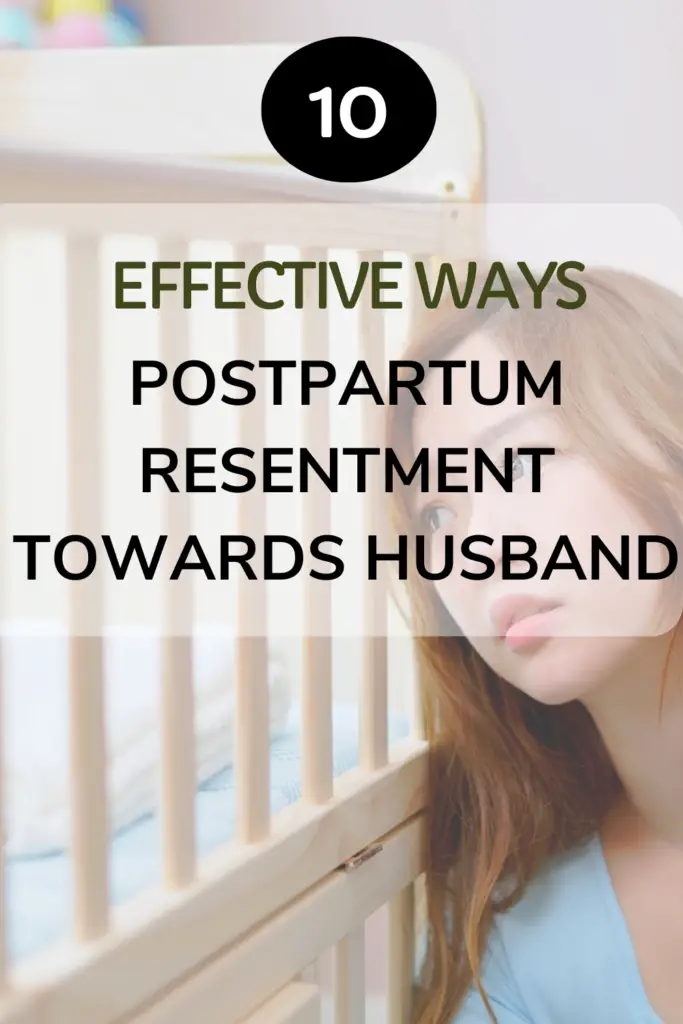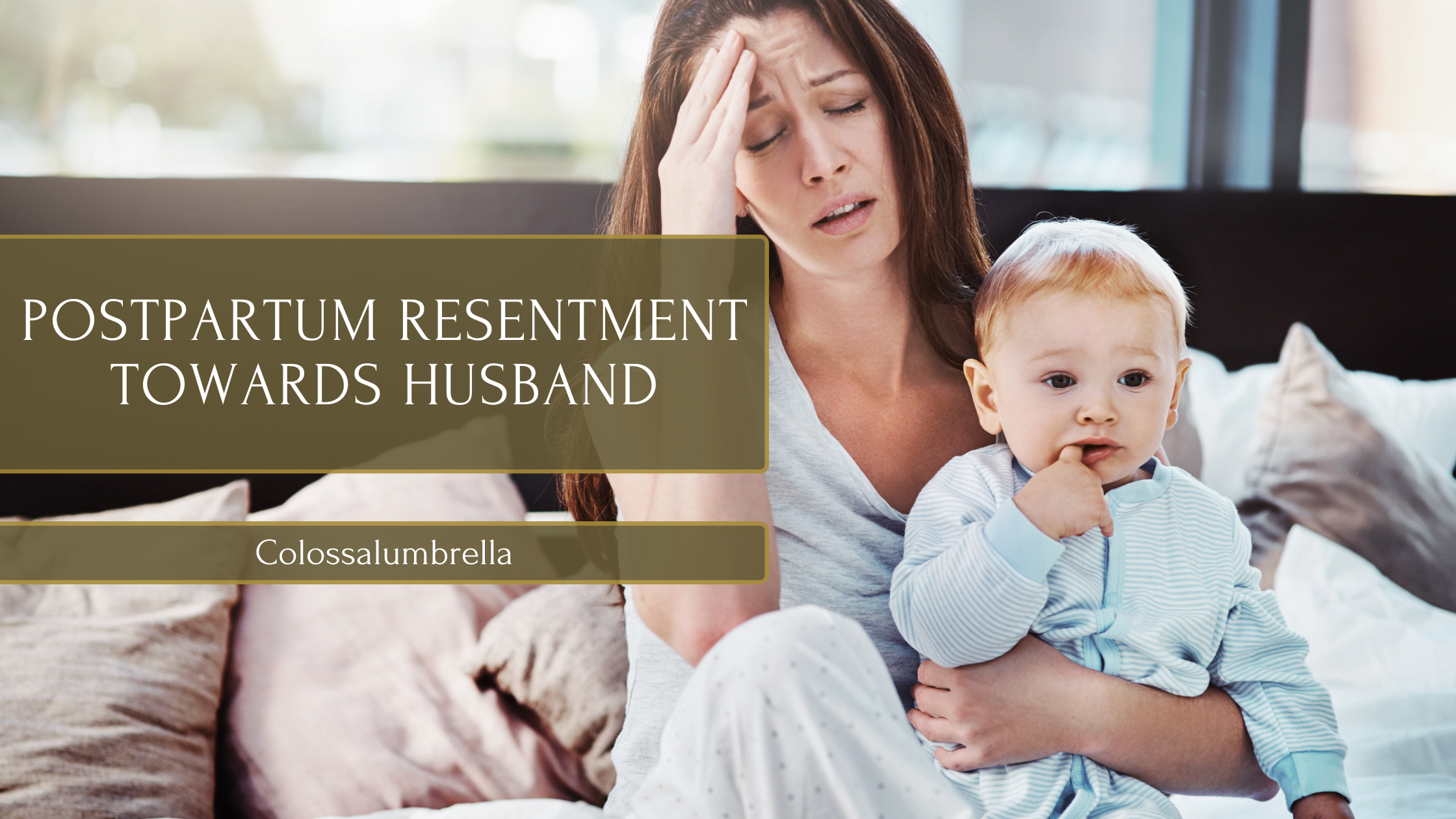Contents
Becoming a new parent is a life-altering experience that brings immense joy and fulfillment. However, it is also a time of immense change, challenges, and emotional upheaval. It is common for mothers to experience postpartum resentment towards husband during this period. The combination of physical recovery, sleep deprivation, hormonal fluctuations, and the overwhelming responsibilities of caring for a newborn can strain even the strongest of relationships.
In this blog post, we will explore the reasons behind postpartum resentment towards husband, the impact it can have on the relationship, and practical strategies to cope with these feelings. By understanding the underlying causes and implementing effective communication and support systems, couples can navigate this challenging phase with greater ease and strengthen their bond as they embark on the journey of parenthood together.
Postpartum Resentment
Postpartum resentment is a common phenomenon experienced by many new mothers. The demands of caring for a newborn, combined with physical recovery and hormonal changes, can create a perfect storm for these feelings to arise.
According to experts, approximately 66% of couples report a decline in relationship satisfaction for up to three years after having a baby. It is essential to acknowledge that feeling resentful toward one’s partner does not make a new mother a bad spouse or parent. It is a normal emotional response to the challenges of this transitional period.
Reasons Behind Postpartum Resentment
Resentment can stem from various factors that contribute to the imbalance of responsibilities and emotional strain experienced by new mothers. It is crucial to recognize these reasons to address the underlying issues and work towards resolving them.
- Physical Recovery: The postpartum period involves significant physical healing for new mothers, whether they have given birth vaginally or via C-section. The body’s adjustment to the changes after pregnancy, combined with the exhaustion from caring for a newborn, can lead to feelings of resentment towards a partner who may not fully comprehend the physical challenges
- Hormonal Fluctuations: Hormonal changes during the postpartum period can contribute to mood swings, irritability, and heightened emotions. These fluctuations can intensify the feelings of resentment towards a partner, especially if they do not offer adequate support or understanding
- Sleep Deprivation: Newborns require round-the-clock care, including frequent feedings throughout the night. The sleep deprivation experienced by new mothers can exacerbate feelings of anger and frustration towards their partners, particularly if they are not actively involved in sharing the nighttime responsibilities
- Lack of Support: The absence of a strong support system, whether from family, friends, or a partner, can amplify feelings of resentment. New mothers may rely heavily on their partners for emotional and practical support, and when this support is lacking, it can lead to frustration and disappointment
18 Effective Ways to deal with postpartum resentment towards husband
Understanding Postpartum Resentment
Postpartum resentment refers to the feelings of bitterness, frustration, and anger that some mothers may experience toward their husbands after childbirth. The reasons for this resentment can be multifaceted, ranging from changes in roles and responsibilities to sleep deprivation and hormonal fluctuations. It is crucial to acknowledge these emotions and address them constructively to maintain a healthy and thriving relationship between partners.
The Transition to Parenthood
The journey into parenthood is a major life transition that affects both partners differently. The shift in roles and responsibilities, combined with the emotional challenges of becoming parents, can lead to misunderstandings and conflicts. Open and honest communication during this time is essential for navigating the complexities of the new roles.
The Role of Hormones
Hormonal changes during postpartum can significantly impact a mother’s emotions. Fluctuations in hormone levels can lead to mood swings and heightened sensitivity, which may contribute to feelings of resentment towards the husband. Understanding these hormonal shifts can help both partners approach each other with empathy and compassion.
Unrealistic Expectations
Society often portrays motherhood and fatherhood in idealized ways that may not align with the reality of parenting. These unrealistic expectations can create pressure and disappointment, fostering resentment between partners. Managing expectations as a couple and embracing the imperfect nature of parenthood can alleviate some of this resentment.
Sleep Deprivation and Exhaustion
The lack of sleep and constant exhaustion that accompany caring for a newborn can take a toll on both partners’ emotional well-being. Sleep deprivation can heighten irritability and reduce patience, making it crucial for couples to support each other in sharing parental responsibilities and finding moments of rest.
Division of Household Chores and Parenting Duties
Traditional gender roles in parenting and household responsibilities can lead to resentment and feelings of inequality. Finding a fair and equitable distribution of tasks can foster a stronger sense of partnership and reduce the burden on one partner.
Communication Breakdowns
Effective communication is the cornerstone of a healthy relationship. However, the stress of new parenthood can lead to communication breakdowns, making it challenging to express emotions and concerns effectively. Encouraging open and honest conversations and actively listening to each other can bridge this gap.
Emotional Support and Empathy
Emotional support is crucial during the postpartum period. Both partners may experience struggles and doubts, making it essential to practice empathy and be there for each other. Building a strong emotional connection as partners and parents lay the foundation for a resilient relationship.
Seeking Professional Help
Sometimes, resolving postpartum resentment may require professional assistance. Couples therapy can provide a safe space to explore underlying issues and develop healthier communication patterns. Seeking help should be seen as a strength, not a weakness.
Self-Care for Both Partners
Prioritizing self-care for parents is vital for maintaining mental and emotional well-being. Encouraging each other’s hobbies and interests and finding time for relaxation can create a nurturing environment within the relationship.
Rekindling Romance and Intimacy
Parenthood can often shift the focus away from the romantic aspect of a relationship. Rekindling romance and intimacy is essential for keeping the connection strong between partners. Small gestures and physical affection can go a long way in maintaining a sense of closeness.
Letting Go of Resentment
Letting go of resentment requires forgiveness and acceptance. Both partners should acknowledge their emotions and work together to find ways to move forward as a couple. Embracing the transformative journey of parenthood together can foster a sense of unity.
Creating a Supportive Network
Building a support network of friends and family can provide invaluable assistance during the postpartum period. Connecting with other parents who have experienced similar challenges can offer a sense of belonging and understanding.
Redefining Roles and Relationships
Parenthood requires couples to adapt and redefine their roles and relationships. Embracing these changes and growing together as individuals and as a couple strengthens the foundation of the relationship.
The Power of Gratitude and Positivity
Practicing gratitude and focusing on the positives can shift the perspective during challenging times. Cultivating a positive mindset together can help couples navigate the complexities of parenthood with greater resilience.
Setting Goals Together
Setting mutual goals as a couple can create a shared sense of purpose and direction. Balancing personal aspirations with family goals encourages teamwork and support.
Being Mindful of Mental Health
Mental health should be a priority for both partners. Recognizing and addressing any mental health issues and supporting each other’s well-being is crucial for a harmonious relationship.
Reinforcing Emotional Connection
Engaging in activities that strengthen the emotional bond between partners is essential. Rediscovering shared interests and hobbies and maintaining intimacy over time contribute to relationship satisfaction.

People Also Ask
Why do I not like my husband after giving birth?
It’s not uncommon for some women to experience a shift in their feelings toward their partners after giving birth. Several factors can contribute to this change, including hormonal fluctuations, sleep deprivation, stress, and the significant life changes that come with becoming a new parent.
Why am I so angry with my partner after having a baby?
Feeling anger towards your partner postpartum can stem from various sources. The demands of taking care of a newborn, coupled with physical and emotional exhaustion, can lead to increased irritability and frustration.
Is it normal to feel resentment towards my husband?
Feeling resentment towards your husband is a common experience for some new mothers. The arrival of a baby often brings significant changes to daily life, and adjustments to new roles can be overwhelming. Resentment may arise if you feel unsupported, or unappreciated, or if responsibilities aren’t distributed fairly.
Conclusion
Postpartum resentment towards husbands is a common challenge faced by many new mothers. By understanding the underlying reasons behind these feelings, implementing effective communication strategies, sharing responsibilities, and embracing imperfection, couples can navigate this period with greater ease and strengthen their bond.
Seeking support when needed and celebrating small victories can contribute to a more positive and fulfilling experience of parenthood. Remember, you are not alone, and with time and effort, you and your partner can overcome postpartum resentment and build a loving and supportive partnership as you embark on the journey of raising your child together.
Disclaimer: The content of this blog is for informational purposes only and is not intended to be a substitute for professional medical advice, diagnosis, or treatment. Always seek the advice of your physician or other qualified healthcare providers with any questions you may have regarding a medical condition.
I would stay connected and keep you updated with parenting tips, pregnancy guides, creative ideas, easy crafts, and Free Printables. Subscribe to Colossalumbrella to get new ideas delivered to your inbox. Follow me on Facebook, Pinterest, Twitter, and Instagram.
